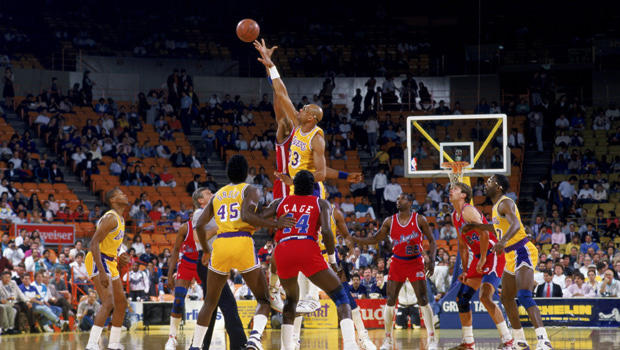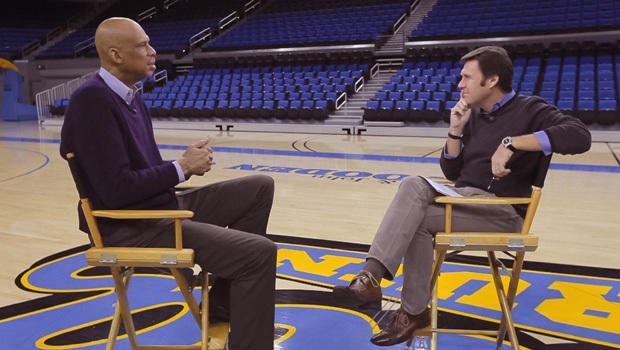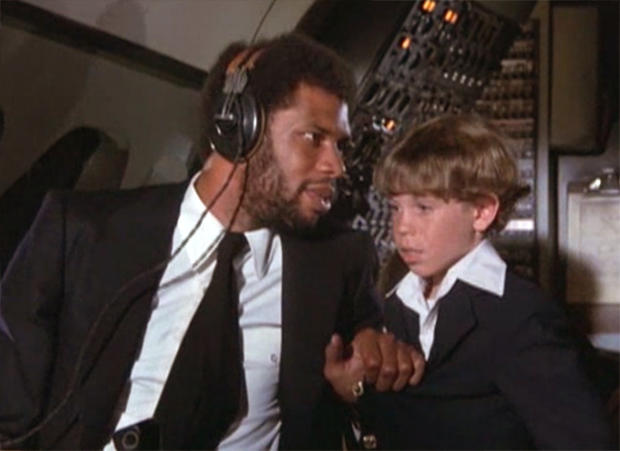Kareem Abdul-Jabbar on life beyond the court
(CBS News) Kareem Abdul-Jabbar is a basketball legend who has made a life and career for himself that extend far beyond his old home on the court. Not that he hasn't tackled challenges along the way, as Lee Cowan tells us in this Sunday Profile:
No pro basketball player in history has given a scoreboard as much to do as Kareem Abdul-Jabbar.
With his trademark "Skyhook," a rainbow that rarely missed, the one-time Milwaukee Buck-turned-L.A. Laker legend racked up an astounding 38,387 points during his 20-year career.
Add to that his six MVPs and 6 NBA championships, and you've got one of the greatest centers to ever play the game.
"I was lucky to play as long as I did," Jabbar said, checking out a new statue of him, towering outside the Staples Center in downtown Los Angeles. "I didn't have anything else to do!"
And yet, he says, all those stats aren't the only measure of his life. "I think worrying about stats is, like, being petty, you know? Totally unnecessary."
"You did what you did," said Cowan.
"Yeah, and people appreciated it," Jabbar continued. "You can't do better than that, you know?"
If he seems a bit understated, that's as much a part of Kareem Abdul-Jabbar's persona as his 7-foot, 2-inch frame.
There was always a mystique about him, not just because he was a Catholic turned Muslim. Not because he hailed Malcolm X, or boycotted the 1968 Olympics.
It was because as a player he was almost unmatched, but as a personality, he seemed just out of reach, with a reputation of being aloof and kind of a loner.
"That's how it ended up," Jabbar said. "Because I was so on guard about giving away anything that would be embarrassing. And that's all you want to avoid."
As a result, he not only tried to avoid the press, but he usually avoided his fans, too. "The spotlight is tough, and it caused some burnout," he said. "I didn't handle it in the best way."
"You think you were just overwhelmed by the celebrity of it all?"
"Of course I was overwhelmed by it. That's not for ordinary people," he laughed. "You know, there's a sense of balance, and when you're in a position like mine, that gets obliterated."
And his reaction? "I withdrew."
He's hardly withdrawn anymore. He just finished competing in the ABC reality show "Splash," a diving competition that had new fans cheering even his flops.
At 65 it was an athletic achievement, especially given that a few years ago he was told he had a rare form of leukemia.
"When I was diagnosed, it was scary. You know, you hear the word 'leukemia' mentioned in conjunction with your name, it's a scary moment. I, really, did not understand how much longer I was going to be living."
He got treatment, and while he's not in remission, he's holding the cancer at bay, and now travels the country giving hope to other leukemia survivors.
"I want to wish all of you, just keep doing what you've been doing," he told one audience. "You know, we're going to lick this thing."
He's found a new audience for that Skyhook of his, too, but today it's in a classroom.
Since his retirement 23 years ago, promoting better education -- for all ages -- has become his passion.
"When you leave here, whenever your four years are up, you can go back to your communities and make a difference," he told a crowd at UCLA -- where it all started for Jabbar.
While he was one of the most dominant players in the NCAA, off the court he took such an interest in English and History that he decided to major in BOTH.
"I'm the first person in my family to get a college degree," he said.
He used it well. Kareem has since written more than half a dozen books, all highlighting the historical and cultural contributions of African Americans in everything from World War II to the invention of the light bulb.
The bags of potato chips he's tossing to kids are a reminder that one of their favorite snacks came from a scientist, not a sports hero or a celebrity.
"They all think they have to be LeBron James or Jay Z or Denzel Washington, you know?" he laughed. "They gotta get beyond that."
He even produced a highly-acclaimed 2011 documentary, "On the Shoulders of Giants." It's the inspiring story of the Harlem Rens, an all-black basketball team the sporting world all but forgot.
They used to play at the Renaissance Ballroom on 138th Street in Harlem. Much to Kareem's disappointment, it's long since been boarded up.
"They were the pride of Harlem because they got to the point where they were the best basketball team in the country," he said. "But they couldn't get recognized because they weren't white."
His frustration with the lack of recognition of so many African Americans, began early. Before changing his name in college, Kareem was known as Lewis Alcindor, born in New York just two years after the end of World War II.
He never lived in Harlem, but its rich culture, its jazz and art, stuck with him, as did what happened on its basketball courts -- Harlem's proving ground.
These were known as the Battle Grounds. "Guys were aggressive, you know?" Jabbar recalled. "People played it like it was a blood game, you know? It wasn't, like, friendly all of the time. It was for honor and prestige, so it could get serious."
He made his mark there, and at his Catholic high school. But many still had their doubts.
"Everybody told me I was too skinny to make it in the professional ranks," Jabbar said. "But I understood that there is more than one way to skin a cat, and there's a lot of different ways to play the game."
He found HIS way to play the game, and now owns most major NBA statistics, not to mention a spot in Hollywood.
Who could forget Kareem playing co-pilot Roger Murdock in "Airplane!" ?
It's so famous, on a recent flight overseas, Kareem had to relive it. A pilot invited him into the cockpit. "Strapped me in, I took off in the cockpit with them. And they said, 'We wanted to tell everybody that we flew with Murdock!'" he laughed.
But out of all his accolades, the trophy he was most excited to show us was . . . a baseball trophy.
"Doesn't signify much, but this is the very first trophy that I got for playing Little League," he told Cowan.
Baseball was his first love, not basketball. "In the 8th grade, I threw the ball 95 miles an hour," he said.
His fans are all a little richer that fate, in the form of a growth spurt, took him the basketball route instead.
Kareem Abdul Jabbar has stood the test of time, not just as a player, but as a person.
"It doesn't bother me that people remember me only as an athlete, but I've been more than that," Jabbar said. "I think my life has proven that. So just the fact that people might think about remembering me, is enough for me. I'll take that."
For more info:
- kareemabduljabbar.com
- "On the Shoulders of Giants" (Documentary)
- "What Color Is My World? The Lost History of African-American Inventors" by Kareem Abdul-Jabbar and Raymond Obstfeld (Candlewick)


